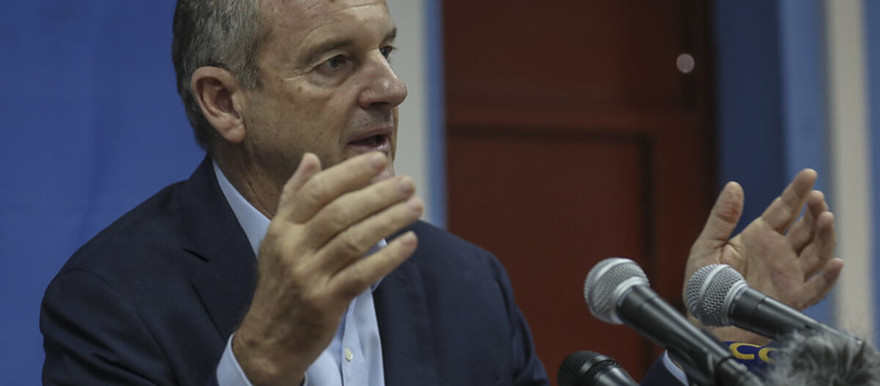David Shearer, the Special Representative of the Secretary-General (SRSG) for South Sudan has tasked the Revitalized Transitional Government of National Unity (RTGoNU) to expedite the formation of local governments.
Shearer who is also the head of the United Nations Mission in South Sudan (UNMISS), spoke during a press briefing yesterday tackling several issues.
He said the appointment of officials at the county level is important to contain conflict.
“A priority is the appointment of officials at the county level to fill the vacuum of power that has existed since the transitional government was formed. Those people are critical to enable problems to be nipped in the bud before they escalate into violence, and are particularly important to cattle migration as we move into the dry season,” Shearer said.
He also said that action has to be seen on several fronts so that the elections can take place at the end of the transitional period, as promised to the citizens of this country.
“I also recently attended the National Dialogue, which is wrapping up today. It’s given people across the country the chance to share their opinion about the future of this country with wide participation ranging from community leaders to farmers, to women, youth and faith-based leaders,” Shearer added. “As you all know, the peace process is top-down. The National Dialogue is bottom-up. People have been speaking frankly, honestly, and without fear about the problems that they are facing personally, but particularly about their disappointment in the peace process.”
The UN boss said it was disappointing that not all parties were represented in the dialogue, “I believe those people who are not there have missed a historic opportunity to come together as a people and have their voices heard.”
He said he has over the last couple of weeks had a series of meetings with the president, some of the vice presidents, as well as senior government ministers.
“We discussed many issues which I’ll touch on a bit later. But a priority for us, and I’m sure for everybody, is the urgent need to breathe fresh life into the peace process, which is currently stalled.” Shearer said.
Rome talks
He revealed the UNMISS has been present at the talks facilitated by Sant’Egidio in Rome, “I was disappointed to see the reports of clashes between the SSPDF and the NAS forces recently, but it’s encouraging to see parties back negotiating about SSOMA possibly being included in the CTSAMVM board by the New Year, which means that they’ll have their activities monitored by CTSAMVM.”
The transition of PoCs to displacement camps
According to Shearer, there has been a successful transition of two of the Protection of Civilians sites (PoCs) into more conventional displacement camps in Wau and Bor.
He said this process has gone smoothly and that displaced communities have been open to the change, despite some initial concerns, and are now working closely with local authorities and the police – who are being strongly supported by UN police – along with continued services provided by humanitarians.
“Today, I am pleased to inform you that the Juba POCs, as of yesterday, has now been re-designated as IDP camps. It has followed a long and careful process, planning alongside humanitarians, and in consultation with national and local government, the security services, and of course the displaced community themselves,” According to Shearer. “The Government now has sovereign responsibility for the sites as it does with many other IDP camps across the country.”
Shearer revealed that the UNMISS is going to embrace an approach in the coming weeks which will see the deployment of troops and staff to protect those in need and to facilitate reconciliation and peace-building efforts.
“As you know, our approach to the protection of civilians is about being proactive, about being nimble, and being robust. We have a responsibility to protect those who need protection the most,” Shearer said. “That means we need to relocate our troops and staff who facilitate reconciliation and peacebuilding into areas of tension, and hopefully address that tension before conflict erupts.”
“So, over the coming weeks, in cooperation with the security services, we will begin deploying peacekeepers to places like Manyabol, Likongule, Duk Padiat, Yuai, and Waat to set up temporary bases there or to conduct extended long-duration patrols,” Shearer added.
The UN boss said that another way to prevent conflict and support peacebuilding is through improving the ability of communities to come together, “For that reason, we now have seven engineering contingents of about nearly 200 people in each, from Bangladesh, China, Korea, Thailand, India, and Pakistan, who are beginning a major road rehabilitation project during the dry season like we have in previous years with WFP.”
“It provides access to services. It increases trade between areas, which brings down the cost of goods in the markets. And it all contributes to economic growth, which again creates jobs. Through roads, peoples from different communities can communicate with each other, and by communication, they can build trust and deter conflict.” Shearer said.




